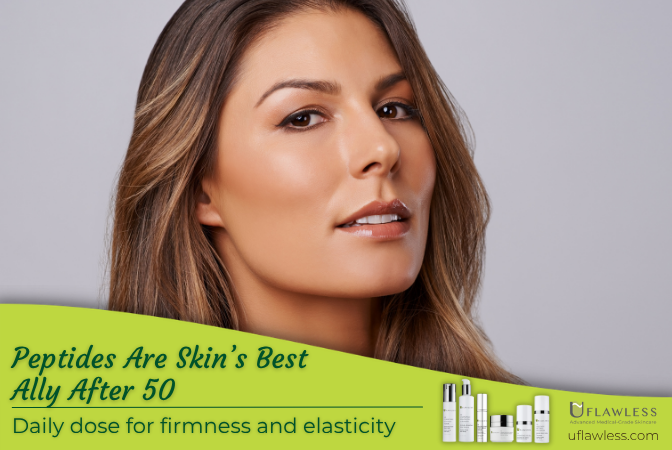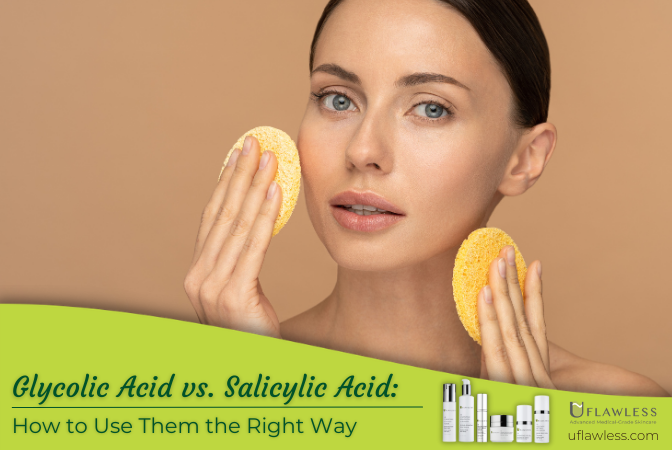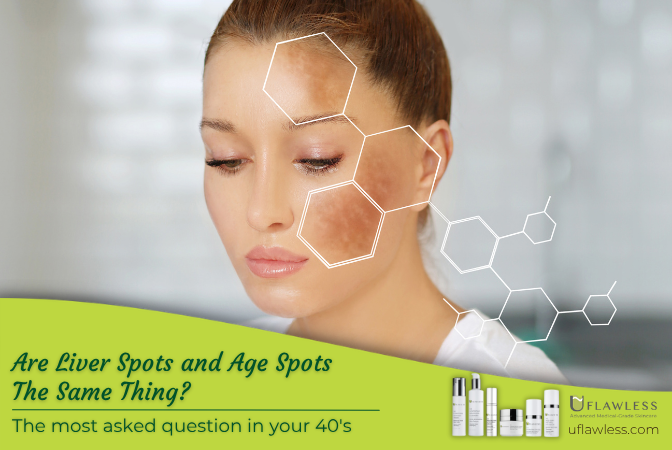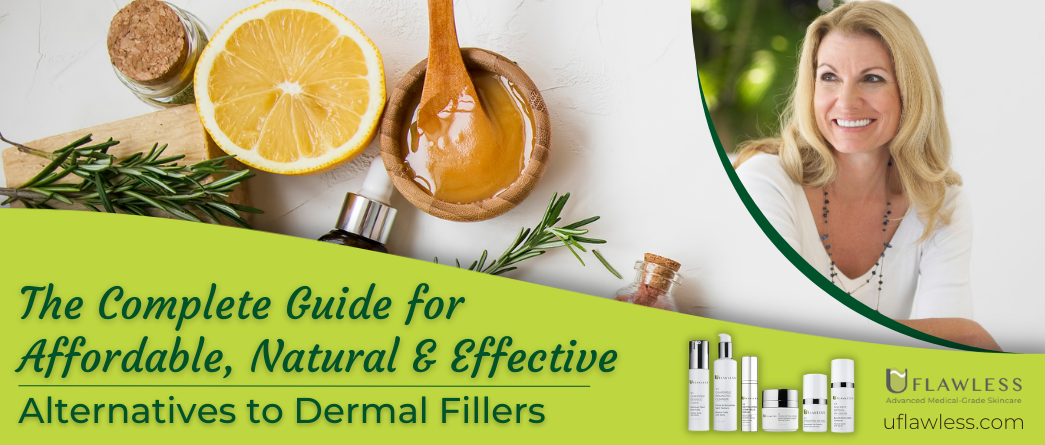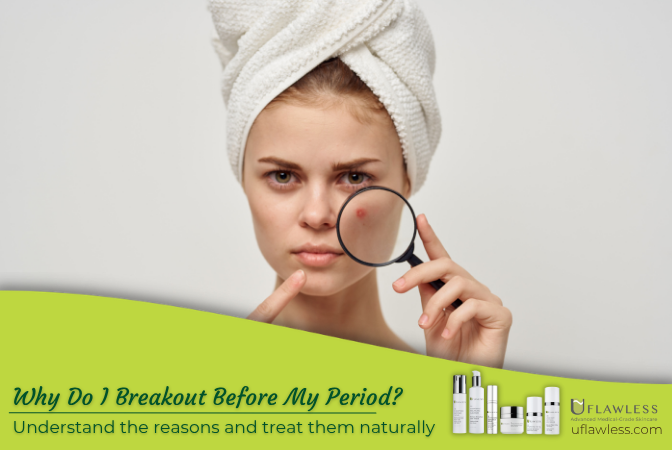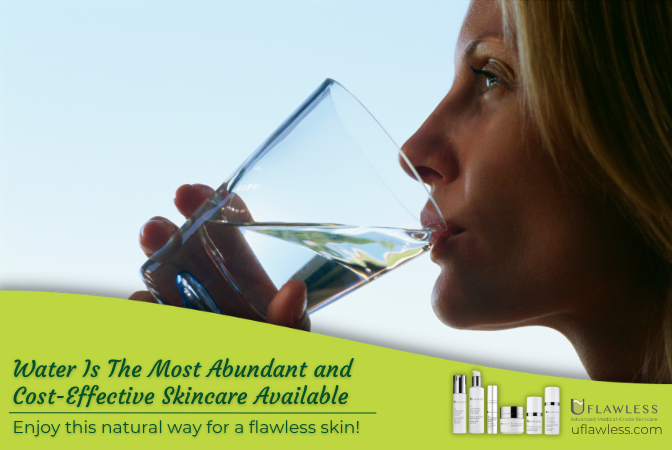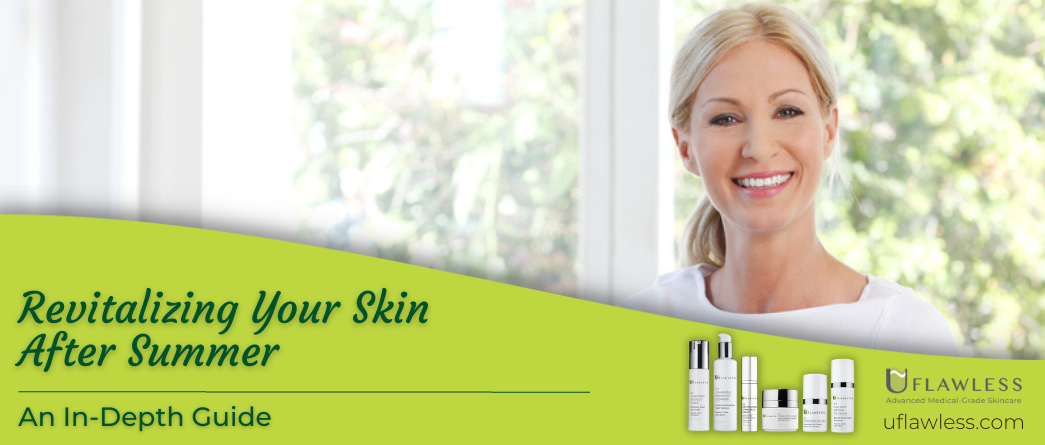
Revitalizing Your Skin After Summer: An In-Depth Guide
As the golden warmth of summer fades into the cozy embrace of fall, our skin confronts the aftermath of prolonged sun exposure, pool days, and gusty sea breezes. In short, it’s time to start revitalizing your skin after summer, with this in-depth guide.
Usher in fall with a vibrant glow, understanding and counteracting summer’s effects are crucial.
Understanding Summer’s Impact on Your Skin
Microscopic Summer Changes
Our skin, while resilient, is sensitive to external changes.
The thickening of the skin in summer is a protective response.
Under the microscope, you’d see a denser array of dead skin cells.
These cells act as a shield against harmful environmental elements, ensuring that the damage remains superficial.
Dehydration: The Silent Challenge
One of the underrated consequences of summer is dehydration.
While we often quench our thirst, the skin’s thirst goes unnoticed.
Prolonged exposure to the sun can impair the skin’s natural barrier, leading to loss of moisture.
This can make the skin look lifeless, emphasizing fine lines and wrinkles.
As we transition into fall, our skin often tells the tale of our sun-filled adventures. it’s time to switch up our skincare routines and give our skin the post-summer TLC it deserves.
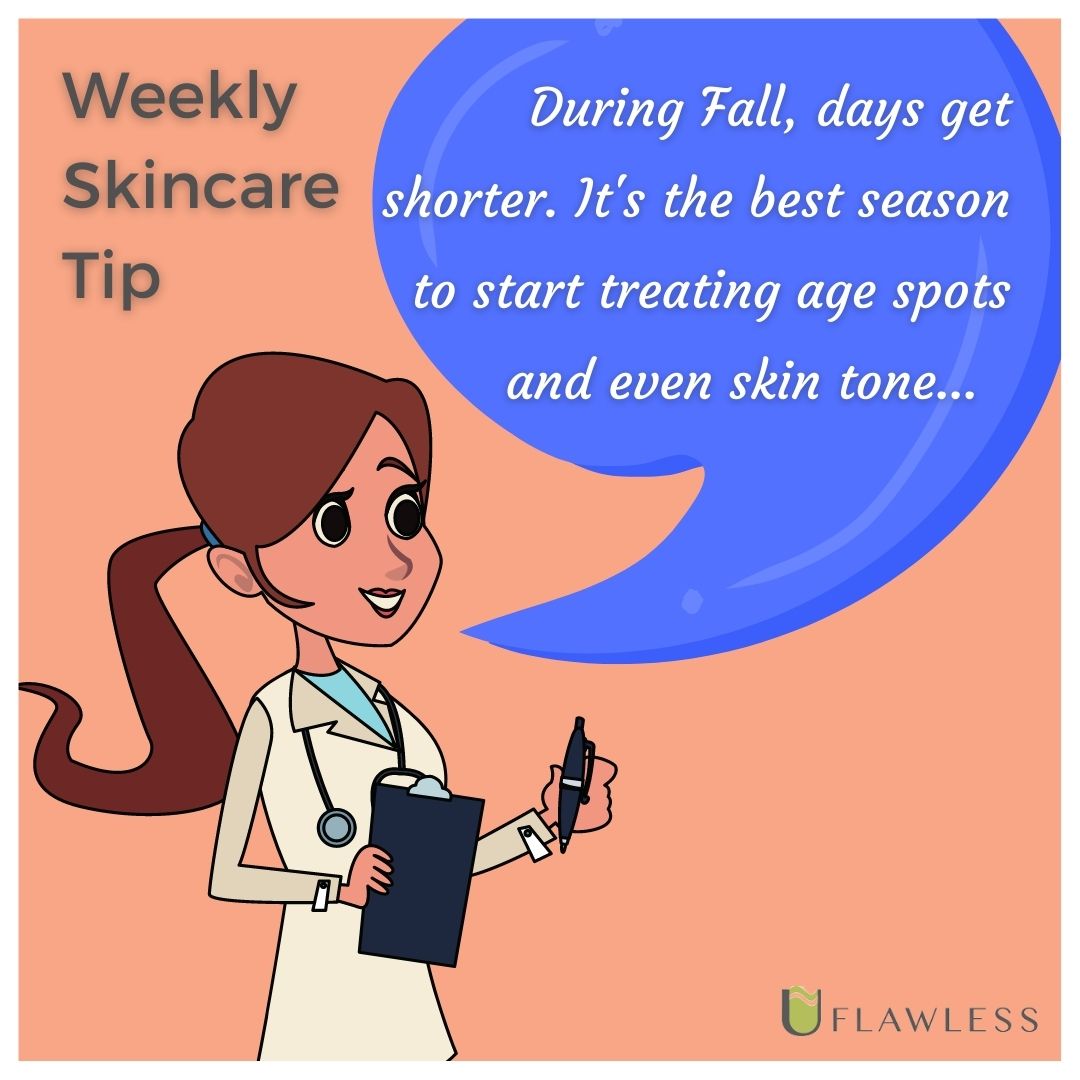
Essentials for Post-Summer Skin Care
Restoring your skin’s vitality requires more than just a change in routine; it requires a comprehensive approach.
Sunscreen: Beyond the Beach to start revitalizing your skin after summer
Sunscreen isn’t just for sunny days. Even ambient sunlight can cause damage.
In cities with high rises or snowy areas, UV rays can reflect off surfaces, intensifying exposure.
Hence, an all-year sunscreen regime is essential. It acts as a defensive shield, reducing cumulative damage.
The best thing about this all-year-round Face Sunscreen is that you’re treating your skin with anti-aging, and brightening actives while protecting your skin. 100% Satisfaction Guaranteed
Antioxidants: Nature’s Defense to start revitalizing your skin after summer
Antioxidants are nature’s gift to combat environmental stressors.
While our body produces some of these, the quantity diminishes with age, making external supplementation essential.
- Vitamin-F & K: These ensure that the skin’s barrier remains intact, reducing water loss and enhancing hydration.
- Vitamin-A: Beyond its anti-aging properties, Vitamin A helps in unclogging pores and reducing breakouts, ensuring a smoother complexion.
- Vitamin-C: This potent antioxidant not only fights free radicals but also inhibits melanin production, reducing dark spots.
Exfoliation: Out with the Old
Exfoliation rejuvenates the skin. Post-summer, this process is even more essential as it swiftly removes the thickened layer of dead skin cells, revealing a fresher layer underneath.
For those wary of over-exfoliation, enzymes offer a milder alternative to acids.
The Perfect Season: Why Fall is Ideal for Skin Treatment and Brightening
Reduced Sun Exposure: Nature’s First Aid
During the summer, our skin is subjected to an onslaught of UV rays.
Even with diligent sunscreen use, the intensity of summer sun can exacerbate skin issues like melasma, freckles, and other forms of hyperpigmentation.
Come fall, the angle of the sun shifts, and days get shorter.
This reduction in UV intensity allows any treatments or products we use to work without the interference of direct, strong sunlight, reducing potential setbacks in the brightening process.
Skin Recovery from Summer Damage
After the summer’s challenges, including sunburns, chlorine, and saltwater exposure, fall provides a cooler, more forgiving environment for the skin to recover.
As the skin recuperates, it’s more receptive to treatments.
Brightening products or treatments work best on skin that’s not actively combating external stressors.
Layering Skincare is Easier
As temperatures drop, the discomfort of layering multiple products diminishes.
This allows for the incorporation of various treatments, serums, and moisturizers without feeling too heavy or causing excessive sweating4.
This layering effect can amplify the results of a brightening regimen.
Prepping for Winter Radiance to start revitalizing your skin after summer
By starting the skin brightening process in the fall, you set the stage for a radiant winter complexion.
The skin is healthier, more even-toned, and better prepared to combat the harshness of winter.
Moreover, holiday events and gatherings are right around the corner in winter, and starting the skin regimen in the fall ensures a bright and glowing appearance just in time for festivities.
Longer Nighttime Enhances Recovery
As nights grow longer in the fall, there’s more time for nighttime skincare routines to work their magic.
Many brightening treatments, like retinoids, are best applied at night due to their photosensitivity.
The extended hours of darkness offer a more extended protective window for such treatments to act without UV interference.
Professional Treatments are More Manageable
For those considering professional skin brightening treatments, such as chemical peels or laser treatments, fall is a preferred time.
The cooler weather makes post-treatment care more manageable, reducing sweat-induced irritations.
Plus, the reduced sun exposure lowers the risk of post-inflammatory hyperpigmentation after such procedures.
Embracing Fall: The Season of Renewal
As the foliage changes color, it’s time for our skincare to undergo a transformation too.
Safe Brightening: Beyond Chemicals to start revitalizing your skin after summer
An even-toned, radiant complexion is achievable without resorting to harsh chemicals.
Hydroquinone, although effective, has side effects.
Alternatives like licorice extract, kojic acid, and niacinamide are gentler, yet effective.
Concerns about Hydroquinone for Brightening The Skin
Hydroquinone has long been a staple in skincare, particularly for its skin-lightening properties.
However, over the years, concerns have arisen about its safety profile, leading many countries to regulate its use or even ban it, such as Japan, Australia, and many countries in Europe.
Let’s take a deeper look at why some experts advise caution or avoidance of hydroquinone in skin products.
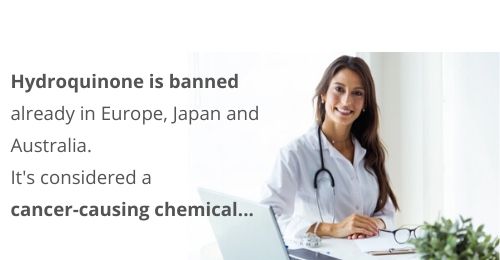
The History of Hydroquinone
Hydroquinone was introduced to the dermatological world over five decades ago and was widely accepted for its impressive ability to lighten dark spots and melasma1.
Over time, however, both anecdotal and scientific evidence began to highlight potential adverse effects associated with its use.
Reasons to Exercise Caution with Hydroquinone
- Ochronosis – One of the most well-known side effects of hydroquinone is a condition called ochronosis.
This is a paradoxical darkening of the skin, characterized by bluish-black pigmentation.
It’s especially prevalent in individuals of African descent but can occur in any skin type.
Once ochronosis sets in, it’s challenging to treat and can be permanent.
- Cytotoxicity to Melanocytes – Hydroquinone works by inhibiting tyrosinase, an enzyme crucial for melanin production.
However, prolonged use can lead to cytotoxicity, causing damage to melanocytes (the skin’s pigment-producing cells)3.
Over time, this can lead to unpredictable pigmentary changes.
- Potential Carcinogenic Properties
Although the evidence is not conclusive, there have been concerns about the carcinogenic properties of hydroquinone.
Some animal studies have shown that oral administration can cause renal tumors in rats.
However, it’s worth noting that these findings are based on ingestion and not topical application.
- Allergic Reactions and Irritation
Some individuals may experience allergic reactions or skin irritation when using products containing hydroquinone.
Symptoms can include redness, itching, and stinging.
- Altered Skin Texture – Extended use of hydroquinone can sometimes lead to thickened and leathery skin texture, altering the skin’s natural appearance and feel.
- Global Regulatory Action – Based on various concerns, several countries, including those in the European Union, Australia, and Japan, have restricted or banned the sale of over-the-counter skin products containing hydroquinone.
In the US, the FDA has proposed a ban but currently allows over-the-counter sales of products with a hydroquinone concentration of up to 2%.
A Balanced Perspective
Ingredients like vitamin C, niacinamide, licorice root extract, and alpha arbutin have shown promise as safer alternatives for those seeking to address hyperpigmentation without the potential side effects of hydroquinone.
UFlawless’ Hydroquinone-Free Routine is crafted for those who prefer a harmonious blend of science and nature:
- X9 Advanced Exfoliating Cleanser: This not only cleanses but also primes the skin, ensuring that it’s receptive to the treatments that follow.
- X9 Brightening Treatment Serum: With a high concentration of actives, serums delve deep, delivering nutrients right into the skin cells.
- X9 Ultimate Brightening Moisturizer: A good moisturizer does more than hydrate. It seals in the benefits of the previous steps, amplifying their effects.
Remember, transitioning your skincare with the seasons ensures that your skin remains resilient, radiant, and refreshed throughout the year.
The X9 Advanced Brightening Routine is a 3-step Hydroquinone-Free combination of products to act directly to prevent and support brightening the skin using Medica-Grade Antioxidants. 100% Satisfaction Guaranteed!
Scientific References to Revitalize Your Skin After Summer
Teramura, T., Mizuno, M., Asano, A., & Naito, N. (2008). Effects of UV irradiation on the sebaceous gland and sebum secretion in hamsters. Journal of Dermatological Science, 50(2), 123-131
Draelos, Z. D. (2007). Skin lightening preparations and the hydroquinone controversy. Dermatologic Therapy, 20(5), 308-313.
Krutmann, J., Bouloc, A., Sore, G., Bernard, B. A., & Passeron, T. (2017). The skin aging exposome. Journal of Dermatological Science, 85(3), 152-161


